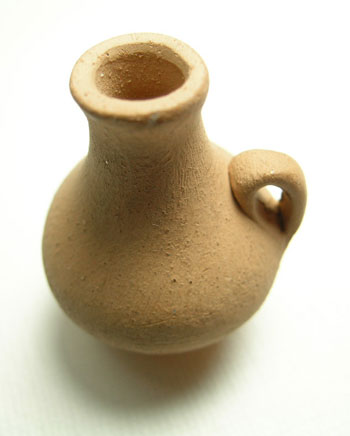| |
Then the word
of the Lord came to Elijah: "Go at once to
Zarephath of Sidon and stay there. I have
commanded a widow in that place to supply you
with food." So Elijah went to Zarephath. When he
came to the town gate, a widow was there
gathering sticks. He called to her and asked,
"Would you bring me a little water in a jar so I
may have a drink?" As she was going to get it,
he called, "And bring me, please, a piece of
bread." "As surely as the Lord your God lives,"
she replied, "I don’t have any bread - only a
handful of flour in a jar and a little oil in a
jug. I am gathering a few sticks to take home
and make a meal for myself and my son, that we
may eat it – and die." (1 Kings 17:8-12) |
 |
What a joy it must have
been for Elijah to hear again the Lord’s direction for
his life! As the implications of the word became
clearer, however, and the still small voice fainter,
bewilderment returned, like a besetting cloud of flies.
Here he was, eagerly awaiting the call to return to
release the rain in Israel, being summoned to the
kingdom of Queen Jezebel’s father. It was like asking a
Christian to go and live in Mecca!
A lesser man would have balked at so strange a command.
What could one man do against such fearsome odds? True,
life in the Spirit was never designed for those who look
too much to their own security, but sending Israel’s
finest prophet out of the country altogether hardly
looks the ideal solution for overthrowing Baal worship.
But the Lord was more interested, for the moment, in
deepening His work in Elijah’s life than in sending him
back to challenge the Baals.
|
The Place of Refining |
|
| |
There are few
things most of us fear so much as losing
face.(1) The Lord’s instructions to Elijah must
have sounded like a death-knell to his pride. To
be told that God intended to provide for him
through a woman was doubly humiliating in a
culture which inhibited men from receiving
anything from the hand of any woman – let alone
a widow.(2) |
|
Seventy difficult and
dangerous desert miles separated Elijah from the aptly
named township of Zarephath: ‘The Place of the
Smelting Furnace.’ It was a prophetic indication of
the refining that lay ahead.
Allegorically, Zarephath represents an important stage
in God’s dealings with us. There are certain things the
Lord can only accomplish by changing our circumstances.
Perhaps many of us can identify with some plants F.B.
Meyer, a celebrated preacher and writer of the last
century, once came across. They were the most luxurious
shrubs he had ever seen, and his enquiries revealed that
they owed their splendour to having been continually
transplanted. So far from weakening the plants, the
repeated replantings had actually served to strengthen
them.
The Lord values our union with Himself so highly that He
is quite prepared to shake all that can be shaken if
this will succeed in purging us of our dross. It is both
a comfort and a challenge, therefore, that the Lord
Jesus tells us, ‘I am the true vine and my Father is the
gardener. He cuts off every branch in me that bears no
fruit, while every branch that does bear fruit He trims
clean so that it will be even more fruitful.’ (3)
The reason for this pruning is simple: a vine that is
left to itself will produce much wood but little fruit.
If the Lord allows us to be at peace for too long, we
may easily become tasteless and complacent. Wine
likewise tastes best when it is poured from one jar to
the other, because the unwanted sediment falls to the
bottom before it is discarded. ‘Moab has been at rest
since youth, like wine left on its dregs, not poured
from one jar to another – she has not gone into exile.
So she tastes as she did, and her aroma is unchanged.’
(4)
We, who are so enamoured with the easy life, rarely
appreciate the Lord’s designs during these unsettling
periods. We feel insecure, resentful even, as He
‘empties us from vessel to vessel.’ Of this we can be
certain: the Lord would not be putting us through such
experiences unless He knew they were necessary, both in
order to fashion His purposes for us, and His life
within us. |

Morguefile
|
‘He must become greater . . .’
Elijah has often been compared with John the
Baptist. Both were the foremost preachers of their day,
as well as the moral conscience of the nation. John had
been recognised from before his birth as a chosen man of
God, but the day came when one greater than himself was
found preaching on his patch. Did he feel resentful or
jealous because his ministry was being superseded? Not
in the slightest. John recognised in this man the
Messiah he himself had foretold, and his unspeakably
humble words echo down to us through the centuries.
‘He must increase (become greater) but I must decrease
(become less).’(5)
Perhaps in no other gesture can John’s greatness be so
clearly seen than in his willingness to hand his own
followers over to Jesus. John’s attitude is the perfect
antidote to all forms of jealousy, and a poignant
reminder that we are to gear all our spiritual work, not
to fulfilling ourselves, but to preparing the Bride for
the Bridegroom.(6)
The most moving story I have heard along these lines
again concerns F.B. Meyer. The time came when this
anointed minister was superseded in popularity as a
conference speaker by a younger man, one Campbell
Morgan. For a time Meyer had to wrestle with the
understandable pain of seeing his followers turning
elsewhere for their spiritual nourishment. Then he hit
upon a splendid way of overcoming his disappointment. He
resolved to spend as much of his spare time as he could
praying for the success of Campbell’s ministry! Would
that all ministers of the gospel were prepared to do the
same.
The Hidden Sacrifice
Understanding little, but doubtless wondering much,
Elijah set out for Zarephath, embracing a summons that
must have seemed like a contradiction to his
life-calling. Submission means placing our future in the
Lord’s hands, and willingly allowing Him to choose where
we should go, and even the means by which He will
provide for us. We dare not boast, ‘Tomorrow I will
do this or that.’ It is the direct command of
Scripture that we should say, ‘If the Lord wills, we
will live and do this or that.’ Even the Lord Jesus
was heard ‘because of His reverent submission.’(7)
At the heart of most anointed ministries we will find
acts of hidden obedience. When Abraham was called to
sacrifice his son, he did not argue with the Lord, but
simply told his servants that he intended to go to Mount
Moriah and worship. This, the first time the word
‘worship’ appears in Scripture, shows that the concept
of worship is undergirded by sacrifice right from the
beginning. A better understanding of this would go a
long way to counteract the brasher elements that have
become so widespread in certain parts of the Church.
In many ways, Abraham’s three day march to sacrifice his
son prefigures the terrible moment when the Father
watched and waited as His own Son walked out to die.
Abraham appears never to have doubted that God still
intended to fulfil His earlier promise, even though He
was taking away the son through whom the promise had
been destined to come.
God was pleased with Abraham’s uncomplaining
obedience.(8) At the very last moment a voice came from
heaven to bid him stay his hand, and Isaac’s life was
gloriously spared. It was Abraham’s heart God had wanted
all along – not Isaac’s life. The provision of a ram, as
an alternative sacrifice, is testimony to the truth
that, even in the midst of our strangest testings, we
will find God tender beyond our wildest imaginings – and
abundantly able to lead us along His chosen path. |
 |
|
Morguefile |
Reflections
Much the Lord does in our lives appears
bewildering at the time. Later, we may be better placed
to appreciate the reason for His actions – or, at least,
to perceive the grace that was with us during those
times of testing. Would we not consider our present
uncertainties in a very different light if we could
enjoy by faith the understanding that hindsight alone
usually brings?
Think of examples of ‘strange guidance’ in your own
life. What have you learnt from them?
|
Selah |
|
| |
Lord Jesus,
grant me the grace to yield to You, and to trust
You even when I cannot understand what You are
doing. Grant me, too, the faith to continue to
affirm and build up others during these dark
times. In Jesus’ name, Amen. |
|
| |
 Morguefile Morguefile |
|
|
|

